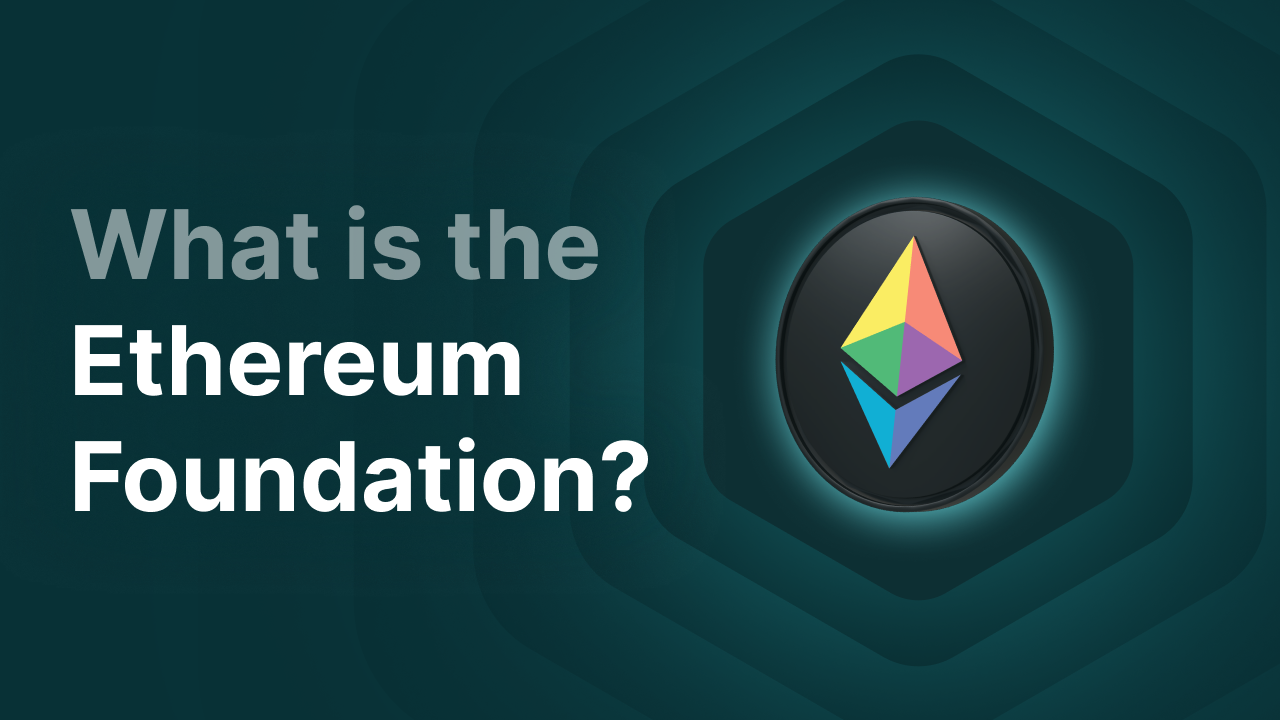What is the Ethereum Foundation and why is it important for Ethereum?

What is the Ethereum Foundation?
The Ethereum Foundation (EF) is an independent non-profit organization dedicated to improving the Ethereum ecosystem. The foundation acts as a kind of bridge between developers, researchers, companies, and communities working together on the future of decentralized technology — and in this case, Ethereum. The Ethereum Foundation does this by providing funding, education, and technical guidance. The Ethereum Foundation does not hold central authority over the network but sees itself more as “a facilitator of innovation.”
Key Takeaways
- The Ethereum Foundation (EF) is an independent non-profit organization that supports the Ethereum ecosystem through funding, research, and education.
- The foundation was established in 2014 in Zug, Switzerland, and raised $18.3 million through a public crowdsale, forming the financial foundation for Ethereum’s development.
- The EF promotes technological innovation by funding independent development teams and research projects.
- Major initiatives include the Ecosystem Support Program (ESP), Devcon, and the Fellowship Program.
- The EF’s long-term focus is on scalability, sustainability, and accessibility, emphasizing innovations like the Fusaka upgrade, which makes the network faster and more efficient.
History of the Ethereum Foundation
The story of the Ethereum Foundation began in 2014 when formal development on Ethereum started under the name Ethereum Switzerland GmbH (EthSuisse). Gavin Wood published the famous Ethereum Yellow Paper, which described the technical specifications of the Ethereum Virtual Machine (EVM). This was the foundation for Ethereum, on which smart contracts now run.
In July 2014, a public crowdsale was held to fund the project. Participants could buy the new currency “Ether” (ETH) in exchange for Bitcoin. During this initial coin offering (ICO), people could purchase as many as 2,000 ETH for 1 Bitcoin (BTC). In total, 60 million ETH were sold in 42 days, raising $18.3 million at the time. This revenue helped establish the financial foundation for the creation of the Ethereum Foundation (Stiftung Ethereum) in Zug, Switzerland — also known as “Crypto Valley.”
The Ethereum Foundation decided to fund multiple independent development teams in various programming languages, such as Geth (GO), Pyethereum (Python), and a C++ implementation. This approach helped ensure the security and stability of the network while laying the foundation for Ethereum’s decentralized structure.
What is the goal of the Ethereum Foundation?
The goal of the Ethereum Foundation is to support the sustainable growth, security, and independence of the Ethereum network.
The foundation primarily focuses on:
- Technological advancement: The EF supports and funds research and development focused on scalability, energy efficiency, and cryptographic innovation.
- Promoting crypto education and adoption: The EF supports open information, conferences, and documentation to help the world understand blockchain technology.
- Collaboration and inclusivity: The EF aims to lower barriers for developers and communities from underrepresented regions to participate in building Ethereum.
The Ethereum Foundation is not an organization that controls the network or dictates development directions. On the contrary, it sees itself as one of many players in a community-driven network where decision-making and innovation are rooted in open-source collaboration.
What Ethereum Foundation initiatives exist?
The EF has three main initiatives: the Ecosystem Support Program, Devcon, and the Fellowship Program.
1. Ecosystem Support Program (ESP)
The Ecosystem Support Program is the primary initiative through which the foundation fulfills its mission. This program provides financial and non-financial assistance to projects that contribute to the growth of the Ethereum ecosystem. It offers grants, mentorships, network support, and advisory resources, ensuring that new projects receive the tools and connections they need to succeed. The ESP evolved from the original Ethereum Grants Program but now focuses more on collaboration and knowledge sharing.
2. Devcon
Since 2014, the Ethereum Foundation has hosted the annual Devcon conference. As the name suggests, it’s a gathering where developers, researchers, and innovators from the Ethereum community come together. Thousands of participants from around the world attend the event to share knowledge, present new ideas, and discuss the future of the network. All Devcon presentations are made publicly available, emphasizing Ethereum’s open and transparent culture.
3. Fellowship Program
The Fellowship Program focuses on diversity, inclusion, and global participation by supporting individuals from underrepresented communities who contribute to Ethereum’s growth in their regions. It’s not just about financial aid — participants also gain access to Ethereum’s global network. Through this, the EF lowers barriers to blockchain participation and builds a more representative and inclusive Web3.
Who leads the Ethereum Foundation?
The Ethereum Foundation is led by a small international team focused on coordination and support rather than control. Aya Miyaguchi has served as Executive Director since 2018. Under her leadership, the foundation has evolved into a transparent, community-driven organization that values education and inclusivity.
The original Ethereum founders — Vitalik Buterin, Gavin Wood, Mihai Alisie, Jeffrey Wilcke, and Joseph Lubin — no longer hold formal positions within the EF. However, Buterin remains an influential voice within the community and frequently participates in research and discussion sessions.
Additionally, the EF collaborates closely with independent teams and organizations such as Consensys, Nethermind, Status, Prysmatic Labs, and the Ethereum Cat Herders. These teams sometimes receive financial or logistical support to accelerate Ethereum development, though they remain independent entities.
Through this decentralized structure, the Ethereum Foundation maintains its independence while promoting global collaboration and innovation.
Research and technological innovation at Ethereum
In addition to community initiatives, the EF also invests heavily in fundamental research.
These are the key focus areas for Ethereum:
- Scalability: Supporting projects related to sharding, rollups, and Layer-2 solutions.
- Security: Improving the smart contract ecosystem and conducting audits of critical infrastructure.
- Energy efficiency: The transition from Proof-of-Work to Proof-of-Stake (the Ethereum Merge) was made possible through years of EF-funded research.
- Zero-knowledge (ZK) technologies: Cryptographic innovations that improve both privacy and transparency.
These research efforts are carried out in collaboration with universities, independent labs, and open-source researchers, helping shape the technological future of the global Web3 ecosystem.
What is the future of the Ethereum Foundation?
In the coming years, the Ethereum Foundation will continue to support collaboration and decentralization within Ethereum. Key priorities for the EF include:
- Scalability and efficiency: Through ongoing implementation of Danksharding, rollup technology, and the upcoming Fusaka upgrade, which introduces PeerDAS and increases network data throughput.
- Sustainability: Strengthening the energy-efficient Proof-of-Stake consensus mechanism.
- Accessibility: Reducing technical barriers through lightweight nodes (enabled by Fusaka) and expanding opportunities for developers worldwide.
- Policy and education: Engaging with governments and the public to address misconceptions about cryptocurrency and blockchain.
The challenge for the Ethereum Foundation remains finding a balance between technological innovation, governance, and inclusivity.
Final thoughts
The Ethereum Foundation has evolved into a central force within the Ethereum ecosystem by fostering innovation, research, and collaboration. As an independent non-profit, the foundation is committed to supporting an open, secure, and sustainable digital infrastructure. Through initiatives like the Ecosystem Support Program, Devcon, and the Fellowship Program, the EF strengthens the global community of developers and researchers. By continuing to invest in scalability, energy efficiency, and cryptographic innovation, the foundation is preparing Ethereum for the next phase of Web3. Developments such as the Fusaka upgrade — which further enhance network scalability and accessibility — highlight the Ethereum Foundation’s role as a leading and unifying force in the global blockchain ecosystem.




